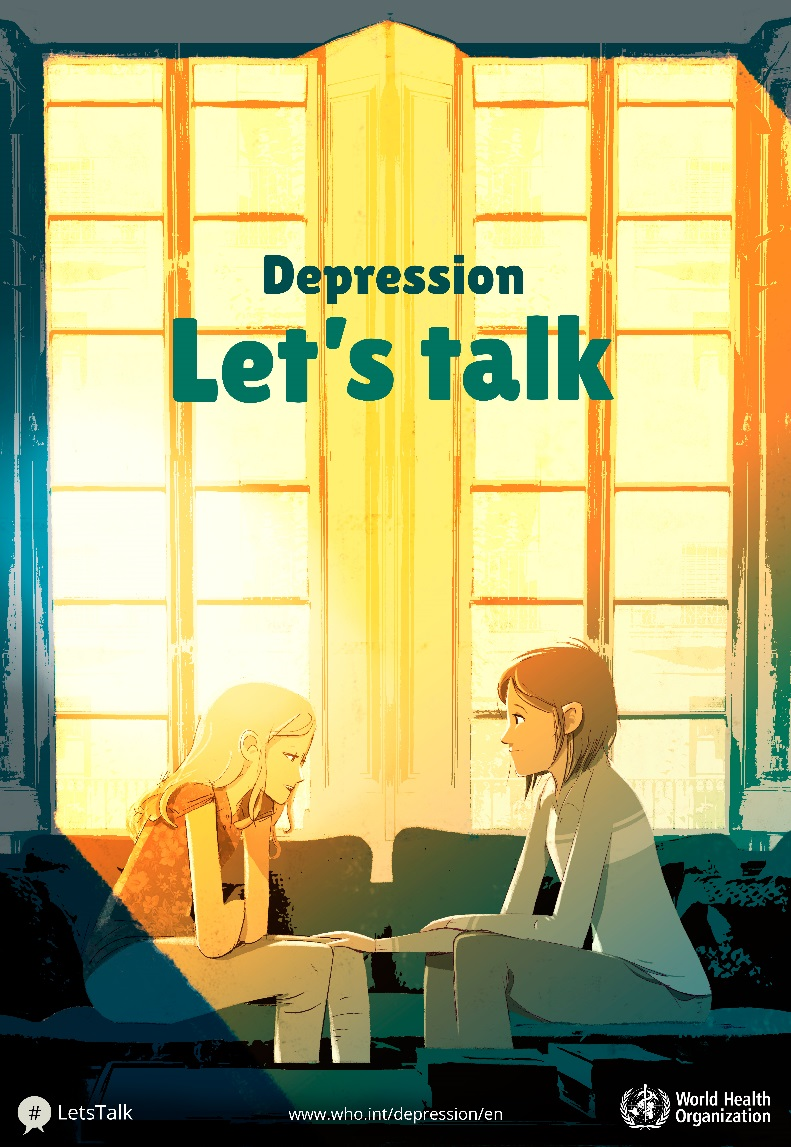Written by Nicole Scholz,

7 April each year is ‘World Health Day’, marking the anniversary of the World Health Organization (WHO), founded in 1948. World Health Day is one of the WHO’s eight official health days for raising awareness and mobilising people to act. This year’s focus is on depression. The WHO campaign has three main goals: that the general public is better informed about what depression is and how it can be prevented and treated; that people with depression seek help; and that family, friends and colleagues of those living with depression are able to provide support.
Depression causes mental anguish, hindering a person’s ability to carry out everyday tasks
Depression is a common illness. Over 300 million people worldwide suffer from depression. More women are affected than men. According to the WHO, depression is characterised by persistent sadness and a loss of interest in activities that a person normally enjoys, accompanied by an inability to carry out daily activities, for a period of at least two weeks. In addition, people with depression normally have several of the following: loss of energy; change in appetite; sleeping more or less; anxiety; reduced concentration; indecisiveness; restlessness; feelings of worthlessness, guilt or hopelessness; and thoughts of self-harm or suicide. Depression can be mild, moderate or severe, and – especially when long-lasting and of moderate or severe intensity – may become a serious health condition. Depression can cause the affected person to suffer greatly and function poorly at home, school or work, with negative consequences for relationships with family and friends and their ability to earn a living. At worst, depression can lead to suicide.
Depression stems from a complex interaction of factors, and it can be prevented and treated
As the WHO points out, depression results from a combination of social, psychological and biological factors. People who have gone through adverse life events, such as bereavement, divorce, job loss, or psychological trauma, are more likely to develop depression. In turn, depression can increase stress and worsen the affected person’s life situation – and compound their depression. There is also an inter-relationship between depression and physical health: cardiovascular diseases, for instance, can lead to depression, and vice versa. Prevention has been shown to work: community approaches to prevent depression include, among others, school-based programmes to enhance patterns of positive thinking in children and adolescents; interventions for parents of children with behavioural problems; or exercise programmes for the elderly. Depression is treatable with psychotherapy or antidepressant medication or a combination of both.
What can you do if you think you may be depressed?
The WHO has issued handouts with advice on preventing depression, for instance in young people or in older age:
- Talk to someone you trust about your feelings.
- Seek professional help.
- Stay connected – keep in contact with family and friends.
- Exercise regularly, even if it is just a short walk.
- Stick to regular eating and sleeping habits.
- Avoid or restrict alcohol consumption as it can worsen depression.
- Continue doing things you have always enjoyed, even if you do not feel like it.
Depression puts pressure on health, economic and welfare systems
Mental disorders, including depression, are one of the most prevalent categories of disease in the EU. They are a leading cause of work absence and early retirement, accounting for some 22 % of European disabilities. According to the WHO’s Regional Office for Europe, the cost of mood disorders and anxiety in the EU is about €170 billion per year.
EU action on mental health, in particular depression
The European Pact for Mental Health and Well-being, launched in 2008, called for action on, among other things, prevention of depression and suicide, since depression is one of the most common and serious mental disorders and a leading risk factor for suicidal behaviour. The pact was followed by a three-year joint action on mental health and well-being, launched in 2013. One of its five focus areas was ‘depression, suicide and eHealth’. The joint action resulted in a framework for action on mental health and well-being, which provides policy recommendations that the Member States are invited to implement. To support their implementation, the Commission employs the EU compass for action on mental health and well-being (2015–2018). The EU compass focuses on issues including depression and resilience; community-based mental health; suicide prevention; and mental health at work and in schools. Mental health is also addressed by EU-financed projects. iFightDepression, developed with financial support from the EU Health programme, is a guided online tool that aims to help people with mild to moderate depression to self-manage their symptoms. The EU framework programme for research and innovation, Horizon 2020, currently funds projects such as MitoDyaD, which studies the role of the glucocorticoid receptor in the vulnerability to stress-induced depression and might lead to the development of novel therapeutics.
The European Parliament Interest Group on Mental Health, Well-being and Brain Disorders, chaired by Nessa Childers (S&D, Ireland), Jean Lambert (Greens/EFA, United Kingdom), Marian Harkin (ALDE, Ireland) and Cristian-Silviu Bușoi (EPP, Romania), was launched in 2009 with the support of the Global Alliance of Mental Illness Advocacy Networks–Europe (Gamian Europe). The interest group’s mission is ‘to advocate the development of sound EU policies which contribute to prevention of mental health problems and ensure good services, care and empowerment for those affected by mental health problems’.
Further reading
EPRS, Spotlight on mental health in Europe, ‘At a glance’ note, October 2016
EPRS, Technological innovation strategies in substance use disorders, Study, March 2017








[…] Source Article from https://epthinktank.eu/2017/04/06/world-health-day-2017-depression-lets-talk/ […]